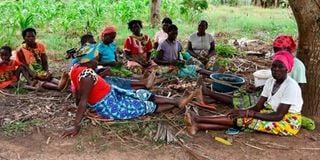Breaking News: Old Kijabe dam tragedy: Death toll rises to 45
For Balagha women, the nearest hospital is 15km away

Women from Balagha hold a meeting under a tree after a day in the farms. They are troubled over the tough times they are facing to access medical services.
What you need to know:
- There are no health facilities in Balagha, forcing residents to seek the services at Sosoni dispensary more than 25 kilometres away or Baolola Health Centre, more than 35 kilometres away.
- Expectant mothers are forced to rely on midwives who are sometimes unavailable during emergencies.
Women from Balagha in Magarini Sub-county are troubled over the tough times they are going through in search of medical services.
There are no health facilities here, forcing residents to seek the services at Sosoni dispensary more than 25 kilometres away or Baolola Health Centre, more than 35 kilometres away.
A resident Kajeni Menza, says the nearest Matolani dispensary is more than 15 kilometres away and it costs Sh100 to get there and back using a boda boda.
Expectant mothers are forced to rely on midwives who are sometimes unavailable during emergencies.
“The distance is far and sometimes expectant mothers give birth on the way to Matolani dispensary. The long journey and high cost to the hospital have discouraged many sick people who opt to visit witchdoctors for treatment,” says Ms Menza.
Died on the way
She adds that some expectant mothers have died on the way, while others have lost their babies due to complications.
“Most women who have not made it to the hospital have succumbed to labour complications, and their babies too. We only have three midwives who are not always available and sometimes when you call them during an emergency at night, they don’t come,” says Ms Menza.
The village midwives charge expectant women Sh1,000 for their services.
“The midwives will not come at night to assist you to deliver but she will check on you in the morning and take the baby for registration at Matolani dispensary,” she adds.
Margaret Jacobs says most women are small-scale farmers and rely on casual jobs to earn a living, hence cannot raise money for hospital.
“Women in Balagha do not have money and during an emergency, they are forced to ask boda boda riders to take them to hospital on credit,” she says.
Ms Jacobs notes that some medical services are not available at Matolani dispensary and patients are forced to go to Sosoni Health Centre where boda boda riders charge them Sh1,000 one way.
Elina Nyevu who suffers from goitre, says medical officers at Matolani dispensary are sometimes unavailable both during the day, and at night.
She says it is worse at night since the nurses do not pick their phones.
“Sometimes you go to hospital and wait for more than five hours without any nurse attending to you, and you are forced to go to Sosoni Hospital,” she adds.
Ms Nyevu says she sometimes suffers breathing complications that require emergency attention, but because of the long distance to the hospital, she has to spend hours on the road, putting her life in danger.
Another villager Samuel Kithi says he sympathises with the women.

Samuel Kithi from Balagha sympathises with the women; he says nurses at Matolani dispensary take national IDs, birth notification and clinical cards from their wives to force them to attend clinics.
“There is no maternity wing at the dispensary and when our wives go there while in labour, they are put in a waiting area before the nurse starts attending to them,” he says.
Mr Kithi discloses that after giving birth at the Matolani dispensary, the nurses hold back the birth notification, clinical card, birth notification receipt and the mother’s national ID to compel them to attend clinics.
“This is not a good practice because these women need their IDs for other things like receiving relief food from the government,” he adds.
Josephine Ngala says the roads too, are bumpy and full of potholes, making the long journey to hospitals uncomfortable, especially for expectant mothers.
“An expectant mother in labour, cannot comfortably ride on a motorbike for more than 15 kilometres as this might add more complications to her and the unborn baby,” she adds.
Ms Ngala says many women do not attend ante-natal and postnatal clinics as a result.

Ms Josephine Ngala speaks to nation.africa at Balagha village. She says women do not attend ante-natal and post-natal clinics due to unavailability of a health facility nearby.
“We lead a difficult life that discourages many people from seeking medical services from hospital. Most expectant mothers opt to stay at home until they give birth, and their babies have never been vaccinated,” she says.
She adds that there is only one matatu that leaves Balagha every morning for Malindi town, complicating issues for patients referred to the Malindi Sub-county Health Centre.
“Sometimes a mother who has just delivered is discharged but is unable to go home due to transport challenges. This forces the nurse on duty to offer her a bed but immediately another patient comes in, she is asked to move out,” she says.
The woman is then forced to spend the whole day on a bench as she waits for the only matatu to go home in the evening, since she cannot use a motorbike.





